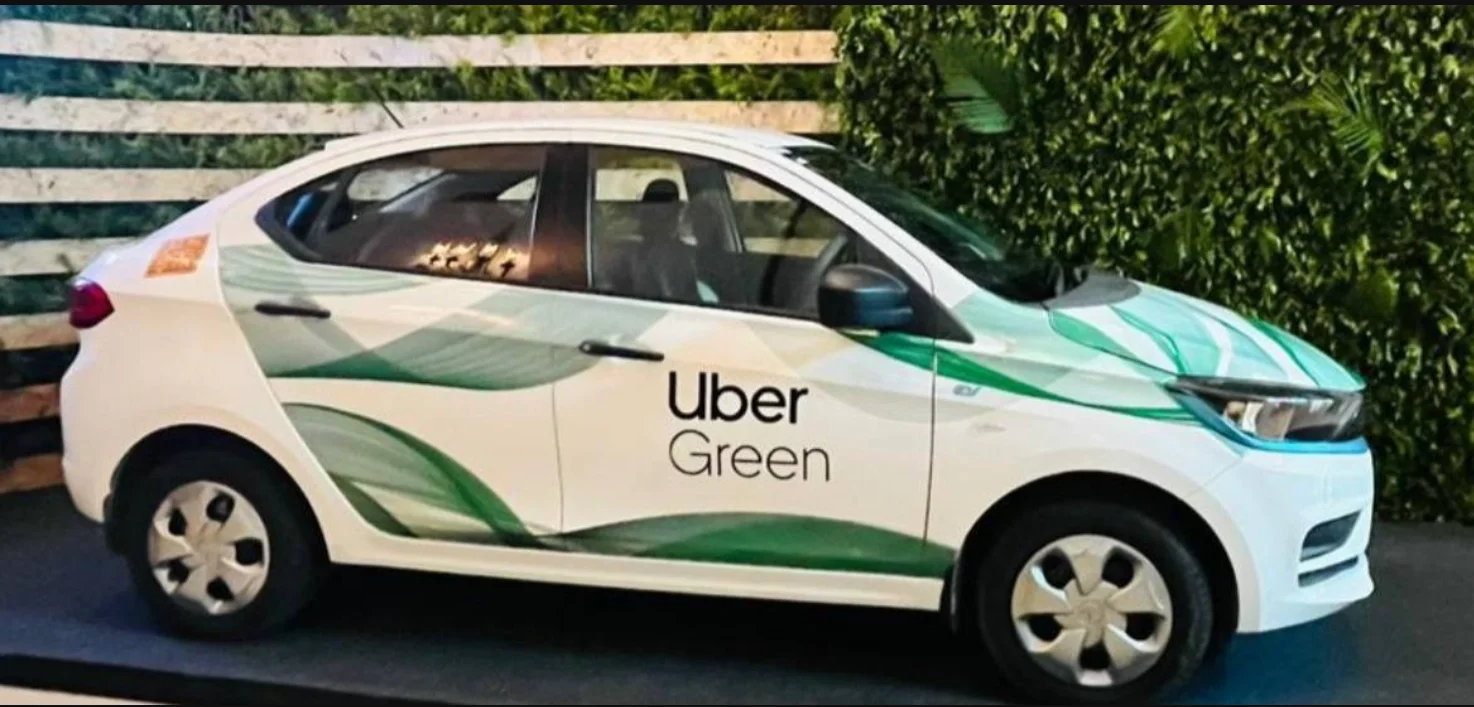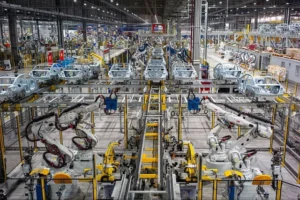The Adani-Uber Alliance: A Potential Game Changer for India’s Electric Vehicle Landscape. The Indian transportation sector is on the cusp of a major transformation. In a move with significant implications, the Adani Group, a major player in Indian infrastructure and energy, is reportedly in discussions with Uber to co-own and operate a fleet of electric vehicles (EVs) in the country.
This potential partnership has the potential to redefine urban mobility in India, accelerate the adoption of electric vehicles, and contribute to a cleaner, more sustainable future for the nation.
Adani Ventures into the EV Arena

The Adani Group, led by the ambitious Gautam Adani, has already carved its name as a leading force in Indian infrastructure, spanning sectors like ports, airports, and power generation.
Now, the group is setting its sights on becoming a significant player in the emerging EV market. This potential partnership with Uber represents a strategic move for Adani, offering them:
- Instant Market Access: By partnering with Uber, Adani gains immediate access to a widespread market for their electric vehicles, bypassing the challenge of establishing brand recognition and distribution channels from scratch.
- Real-World Data Collection:
- Integrating their EVs into Uber’s platform would provide them with invaluable real-world data on vehicle performance, user behavior, and charging patterns. This data would be instrumental in refining their EV strategy, identifying areas for improvement, and developing future iterations of their electric vehicles.
Uber’s Quest for Electrification:
Driven by a global commitment to becoming a zero-emission platform by 2040, Uber requires a complete overhaul of its current fleet, which primarily relies on gasoline-powered vehicles. Partnering with a heavyweight like Adani presents them with a golden opportunity to:
- Fast-Track EV Adoption: Collaborating with Adani allows Uber to accelerate their EV transition in India, a market with immense potential for growth in the ride-hailing sector. This rapid adoption would bring them closer to achieving their global sustainability goals.
- Reduced Operational Costs: EVs generally have lower operating costs compared to gasoline vehicles. If translated into competitive fares for riders, this could further solidify Uber’s market position in India.
The Road Ahead
While the potential benefits of the Adani-Uber partnership are undeniable, there are also significant challenges to overcome:
- Government Incentives:
- The success of this venture hinges on the continued and potentially enhanced government support through subsidies and tax breaks for EVs and EV infrastructure.
- Charging Infrastructure:
- Building a robust network of charging stations across the country is crucial to address consumer concerns about range anxiety and encourage widespread EV adoption.
- EV Pricing:
- Making EVs a viable option for the masses requires collaboration with EV manufacturers to bring down vehicle costs and develop innovative financing models that make purchasing EVs more accessible.
A Spark for Sustainability:
If the Adani-Uber partnership successfully navigates these challenges, it has the potential to be a game-changer for India’s EV landscape in several ways:
- Accelerated EV Adoption:
- By providing readily available and potentially affordable EVs through Uber’s platform, the partnership could significantly reduce India’s reliance on traditional gasoline vehicles, contributing to cleaner air and a lower carbon footprint.
- Booming EV Ecosystem:
- Increased demand for EVs would undoubtedly attract further investment in the sector, leading to the development of a thriving EV ecosystem in India. This includes not only manufacturing facilities but also battery technology advancements, charging infrastructure development, and job creation.
- Sustainable Future:
- By promoting electric mobility, the Adani-Uber partnership could play a significant role in reducing India’s carbon footprint, contributing to a cleaner, more sustainable future for the nation.
The potential Adani-Uber collaboration is more than just a corporate deal; it’s a potential catalyst for a cleaner and greener India. The coming months will be crucial in determining the shape and impact of this collaboration. With careful planning, strategic execution, and continued government support, this partnership has the potential to revolutionize India’s transportation landscape and pave the way for a more sustainable future.
A Mutually Beneficial Collaboration

The details of the potential partnership remain confidential, but it is expected to be a win-win situation for both parties.
Adani would likely use their financial resources to purchase and brand the EVs, while Uber would manage the fleet operations and integrate the vehicles into their ride-hailing platform.
Benefits for Adani:
- Market Access:
- Gaining immediate access to a widespread market for their EVs.
- Real-World Data:
- Collecting valuable data on vehicle performance and user behavior.
- EV Strategy Refinement:
- Using the data to refine their EV strategy and develop future iterations of their electric vehicles.
Benefits for Uber:
- Fast-Tracked EV Adoption:
- Accelerating their EV transition in India, a crucial market for their global ambitions.
- Reduced Operational Costs:
- Potentially lower operational costs associated with EVs could translate into competitive fares for riders, further solidifying Uber’s market position.
Challenges and Opportunities:

Image from @IndianTechGuide
While the potential benefits of the Adani-Uber partnership are undeniable, the road ahead is not without significant hurdles. Overcoming these challenges will be crucial to ensure the success of the venture and its impact on India’s EV landscape.
1. Government Incentives:
The success of this venture hinges heavily on continued and potentially enhanced government support through various measures. These include:
- Subsidies: Extending and potentially increasing existing subsidies for electric vehicles and EV infrastructure would make them more affordable for both consumers and companies like Adani, encouraging wider adoption.
- Tax Breaks: Offering tax breaks on EVs and EV-related investments can further incentivize individuals and businesses to participate in the transition to electric mobility.
- Policy Framework: Establishing a clear and comprehensive policy framework for the EV sector, including long-term vision, specific targets, and streamlined regulations, would provide much-needed stability and direction for market participants like Adani and Uber.
2. Charging Infrastructure:
Range anxiety, the fear of running out of battery power before reaching a charging station, is a major barrier to widespread EV adoption. To address this concern, building a robust network of charging stations across the country is essential. This requires:
- Strategic Deployment:
- Installing charging stations at key locations like highways, urban centers, and parking lots would provide convenient charging options for users and alleviate range anxiety.
- Collaboration:
- Public-private partnerships between the government, Adani, Uber, and other stakeholders can accelerate the deployment of charging infrastructure, leveraging resources and expertise effectively.
- Technology Integration:
- Exploring and implementing innovative solutions like fast-charging stations and battery swapping technologies can further address charging concerns and enhance user experience.
3. EV Pricing:
Currently, the upfront cost of electric vehicles remains a significant barrier for many potential buyers. To make EVs a viable option for the masses, several initiatives are needed:
- Collaboration with Manufacturers:
- Adani can collaborate with EV manufacturers to bring down production costs through economies of scale, technology advancements, and efficient supply chain management.
- Innovative Financing Models:
- Developing innovative financing models, such as leasing options, battery rentals, and pay-as-you-go charging plans, can make EVs more accessible by reducing the upfront financial burden for consumers.
- Used EV Market Development:
- Establishing a robust used EV market can offer more affordable options for potential buyers, further encouraging widespread adoption.
Addressing these challenges through a combination of government support, strategic infrastructure development, and collaborative efforts with EV manufacturers will be crucial for the success of the Adani-Uber partnership.
By effectively navigating these challenges, the partnership has the potential to significantly contribute to India’s EV revolution and create a cleaner, more sustainable future for the nation.
Potential Impact:
If the partnership overcomes these challenges, it could be a game-changer for India’s EV landscape:
- Accelerated EV Adoption:
- By providing readily available and potentially affordable EVs through Uber’s platform, the partnership could significantly reduce reliance on traditional gasoline vehicles.
- Booming EV Ecosystem:
- Increased demand for EVs would attract further investment in the sector, leading to the development of a thriving EV ecosystem in India.
- Sustainable Future:
- Promoting electric mobility could play a significant role in reducing India’s carbon footprint and contributing to a cleaner, more sustainable future.
The potential Adani-Uber partnership is more than just a corporate deal; it’s a potential catalyst for a cleaner and greener India. As the two entities join forces, the coming months will be crucial in determining the shape and impact of this collaboration. With careful planning, strategic execution, and continued government support, this partnership has the potential to revolutionize India’s transportation landscape and pave the way for a more sustainable future.
Please share your thoughts in comment about , at theproductrecap.com we are open to friendly suggestions and helpful inputs to keep awareness at peak.




